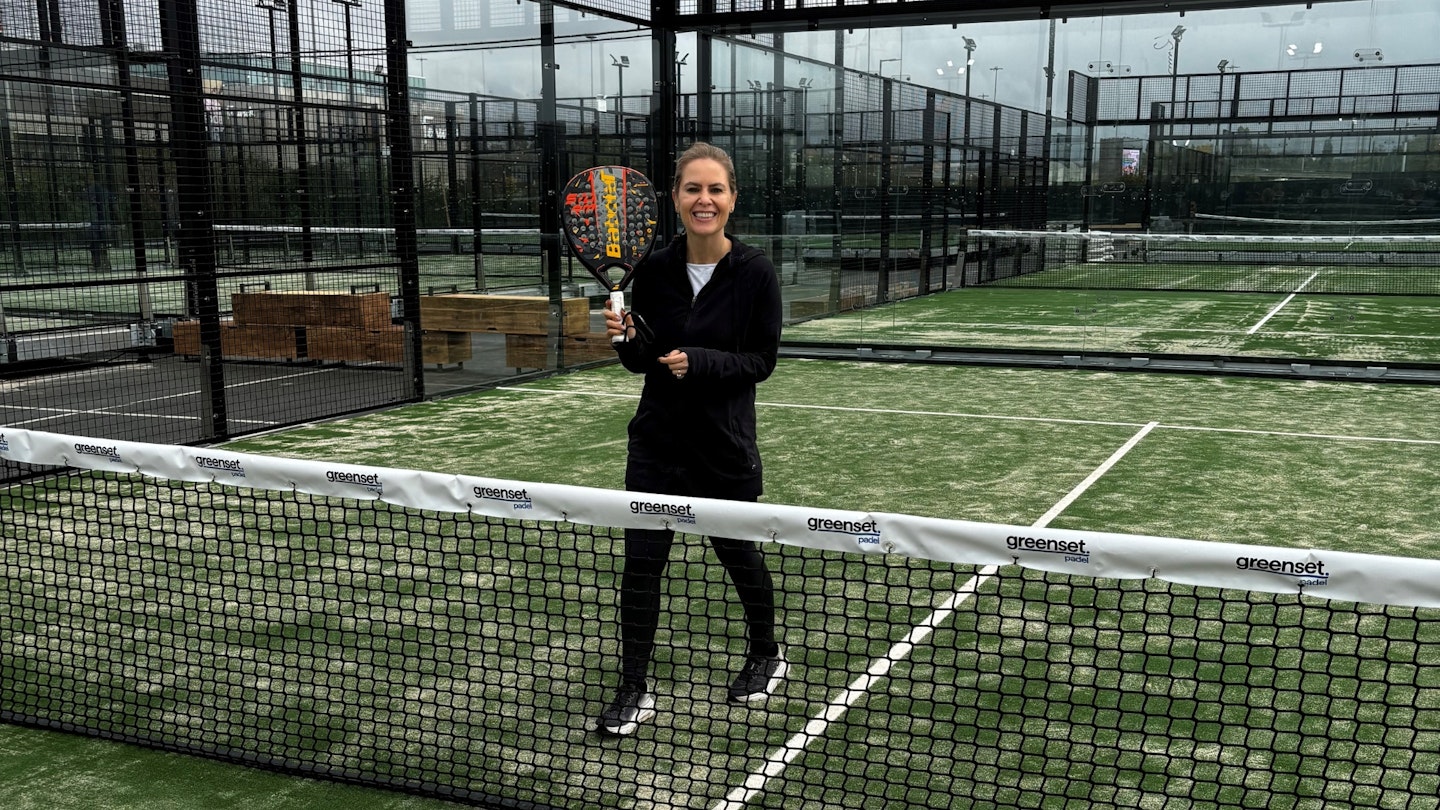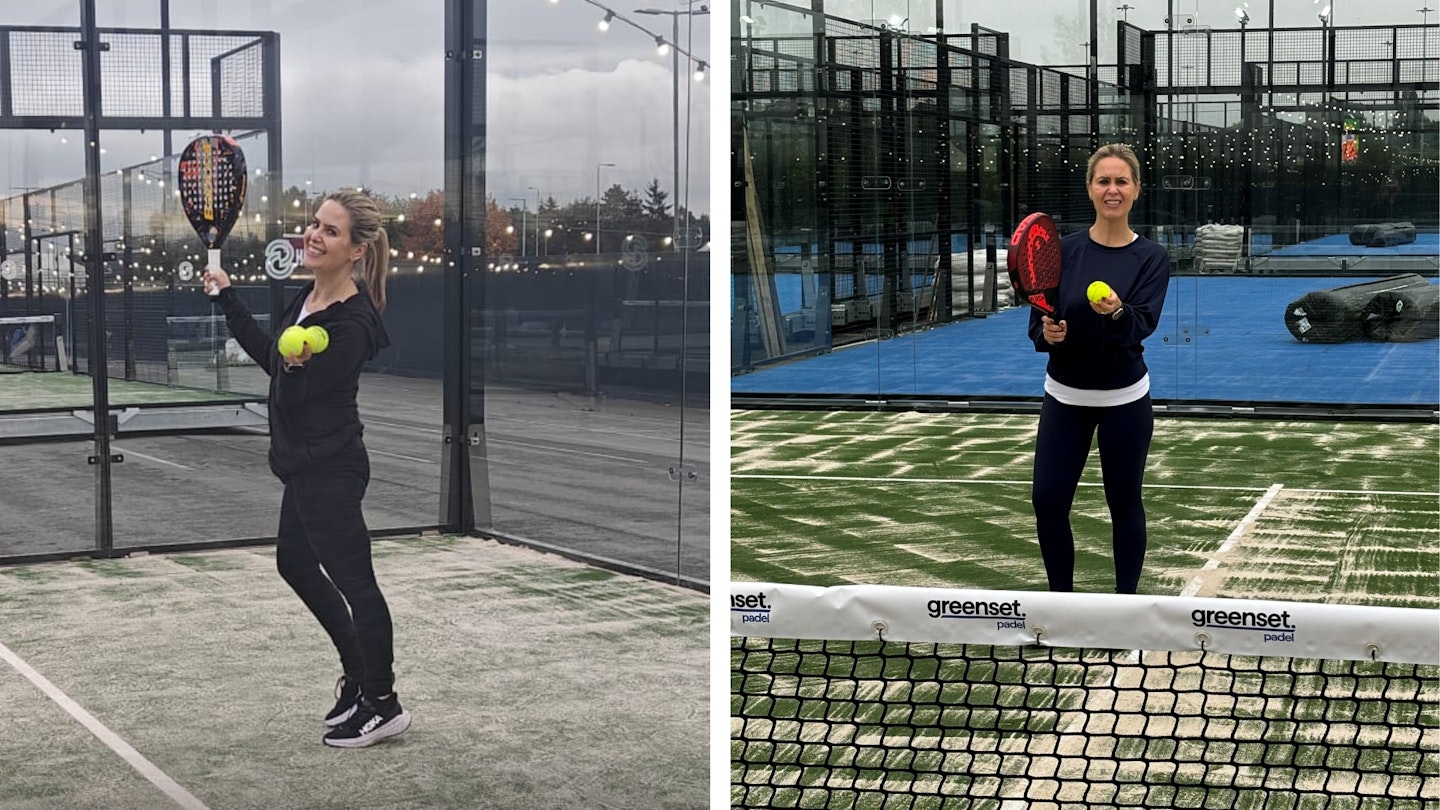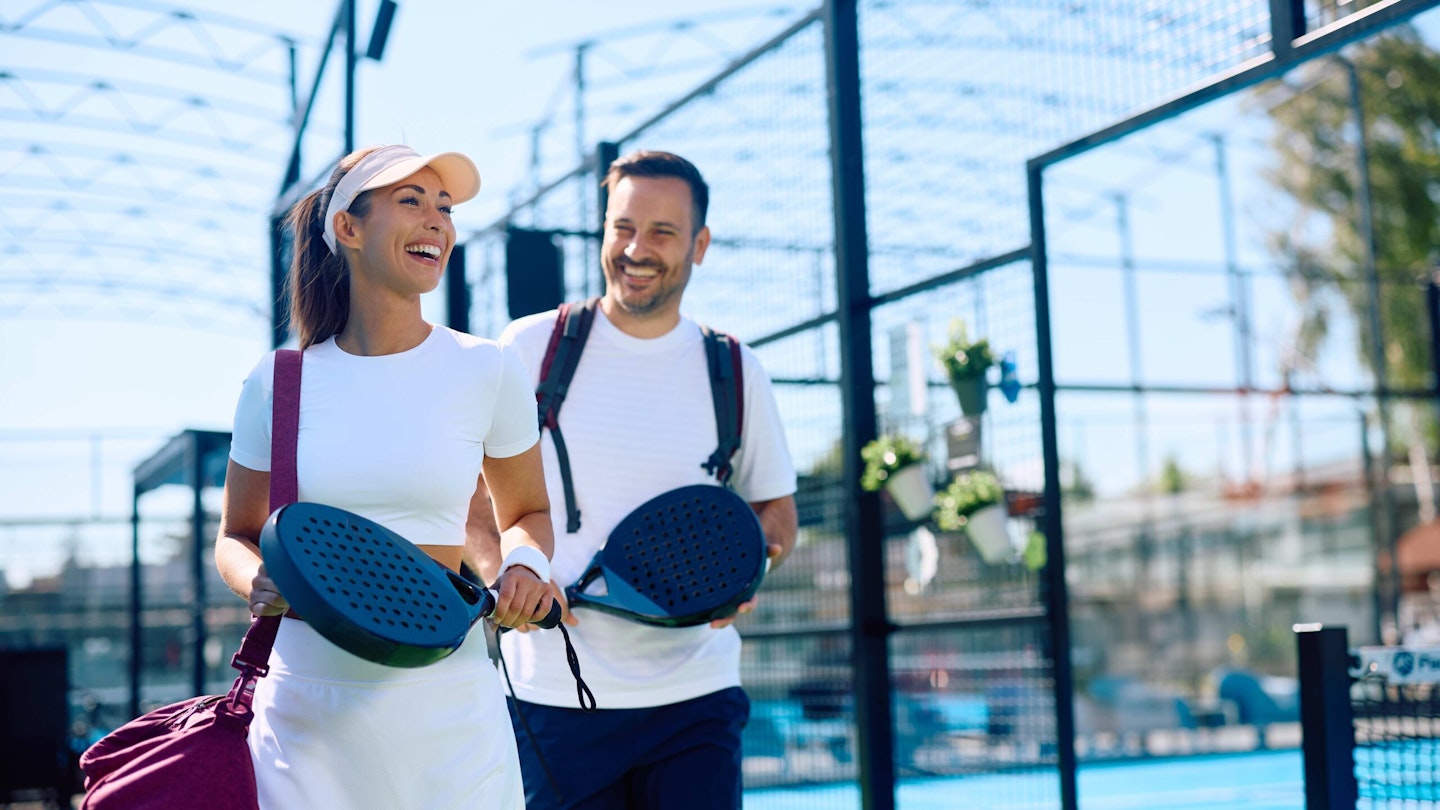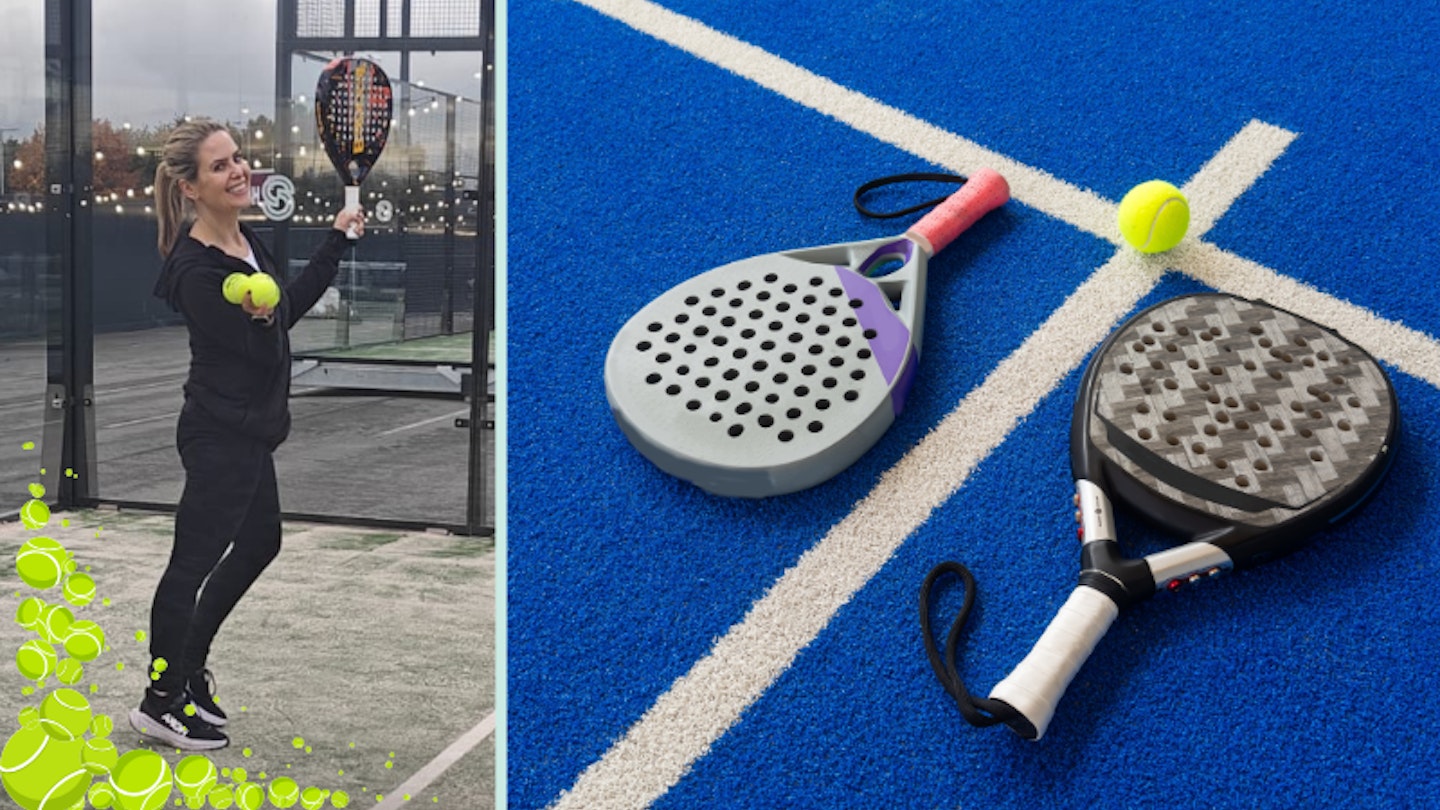It’s the fastest growing sport in the world and writer Suzanne Baum is totally addicted. The 51-year-old explains to Yours why the ball is in her court and how padel can benefit older women.
I’ve been causing quite a racket these days with a new found passion. In fact, I’d say it’s more than a passion, bordering on obsession. And it has two words: padel tennis (a kind of mix between tennis and squash). I’m addicted. Despite years of being a fitness editor and writing on every sport going – from covering the Olympics to being the first UK journalist to work with the Peloton brand on the 2020 launch of their tread – nothing has ever really brought me out in a cold sweat of excitement. Until I discovered padel. And through the sport – that is the fastest growing one in the world – I’ve not only become fitter but happier too as the buzz I get from playing is on another level. I can only describe it as my face actually hurts from smiling – because that is what I do for the whole hour of the match.
I’m not alone in my passion for padel tennis - apparently over 30 million people worldwide play it. And that statistic is remarkable, considering it was only invented in 1969 by a husband and wife team on holiday as a way to avoid boredom. And whilst I’ve heard of padel tennis through my years of writing on fitness, it’s only since I started playing myself that I’ve realised why it is so popular, so much so that everyone I know seems to be talking about it.

As a 51-year-old mum-of-three super sporty sons they laugh at my passion to play but they also say how proud they are of me to finally be sticking to a sport I love. I’ve always been one to dip in and out of fitness trends, often because boredom strikes, but padel I’ve stuck to for the last few months, playing up to four times a week. Whilst I’ve never been overly good at sport, I was always an excellent tennis player - representing my old school team and going on to play it regularly over the decades - so I think that has helped me grasp the game (which has the same scoring system as tennis). Yet, what makes padel so appealing is that it is a game for all ages and fitness levels, so literally anyone can play.
Such is my obsession for padel, I’ve been a regular fixture at a new club that has just opened locally to me. And as the first ambassador for the North London Social Sports Society Brent Cross club, (that has a site in Wembley and others in the planning), it’s been a joy to share my love for the sport with friends. In fact, my initial padel WhatsApp group I set up last week is rising in numbers, with more and more people wanting to play.
For me, I know the importance of keeping fit and my bones strong in this decade of my life, plus playing outdoors is the best boost for my mental health, and Yours’ resident fitness expert, Becky Fuller, agrees:
“Padel is a great choice of exercise for women as they age. It’s a good form of cardio exercise, so the heart and lungs are going to be working hard. It’s also great for strengthening joints – something that can really affect us as we age.
The twisting motion of the knees, hips and core will build resilience, and the impact of any racquet sport helps maintain strength in the arms.
The benefits of exercise on our mental health are enormous, and padel is a great example of how it can tick so many boxes. There’s the socialisation aspect – being with friends or meeting new people, which boosts our serotonin levels (known as the happy hormone). Being outside is known to help regulate our circadian rhythm, reduce stress and again, make us happier and of course, you’re moving your body, something proven to aid mental wellbeing.”

On my way home from a match yesterday where I doubled up with my husband (padel is a game of four people), I told him I felt like the match had breathed life in to me after waking up with a hangover - and that’s how I sum it up. It makes me feel alive. I’ve even stopped watching dog reels on my Instagram, scrolling instead for padel content in a bid to pick up some valuable tips. For example, whilst I can hit the ball back and forth and get a good rally going I cannot get the hang of hitting the ball off the back glass; one of the more skilful padel shots. And this is the main difference between tennis and padel; a padel court is 10×20 meters surrounded by glass walls and metal mesh which you can play off against in certain shots.
Although my club is outside (with plans to cover it soon), I’ve not minded a match in all weather conditions and even rain has not stopped play. That is how addictive it is. And whilst I’ve never been one to get a “runners high”, I’m pretty sure the euphoria I feel after a game of padel comes close.
Such is the popularity of the sport, there are rumours that it may feature in Brisbane in the 2032 Olympics and I wouldn’t be surprised. Whilst I’m conscious I may be a padel bore, talking about it the whole time, it’s nice to have my eye on the ball. In the words of Jorge Martinez, the UK 1 ranked player who I recently had the pleasure of playing with: “There are so many reasons why it is such a growing sport. It is so much fun, you get a good workout, you learn about coordination, it’s not intimidating, and it offers amazing stress relief.’ And, it seems, the social factor is perhaps the biggest pull.
“As padel requires four people to play, you meet so many people; the interaction is brilliant and you literally bounce off each other - pun intended!”

Benefits of padel for older women
Social interaction – as padel is such a fun sport it has a great social aspect to it. And being a game of four players, it is a good way to connect with others.
Travel opportunities – for older people who may have retired padel offers you the opportunity to travel as it is played all around the world; most notable in Spain, Mexico and Argentina.
It is a low impact sport – one of the advantages of padel for older people is that it is a low impact sport. The court is smaller than a tennis court and the ball is softer, making it easier on the joints to move around.
It improves balance and coordination – as we age we can become unsteady on our feet so doing things to improve our balance and coordination becomes crucial for preventing falls.
Mental stimulation - padel requires tactical thinking and offers up mental challenges during the game which can be beneficial for cognitive function.
Mood and sleep – physical exercise stimulates the production of endorphins, the body's natural mood lifters, and can also help regulate sleep patterns.
For more details, visit Social Sports Society.
Suzanne Baum is an award-winning beauty editor, with columns across numerous outlets, including the Metro, Women's Fitness, the Independent and Yahoo.
